
The President’s Message:
It is a short message this month.
We will have some rare and interesting books for sale at the
March meeting. Dues are
due.
Gerridine LaRovere
March 8, 2023 Program:
The March speaker will be Robert Krasner.
His program will be
The Life of William Barker Cushing.
He is known for his daring midnight raid on the Albemarle on
October 27, 1864. Robert
will talk about the Commander’s sudden dismissal from the Naval Academy
yet becoming one of the most heroic figures during the Civil War.
February
8, 2023 Program:
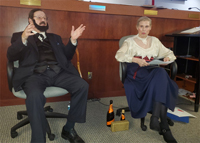 The
Round Table Players presented a play in one act,
Halos or Horns,
about a Planter, Traitor, Lawyer, or Spy.
Gerridine LaRovere and William McEachern delivered a living
history play about Jacob Thompson, a Confederate officer and politician
who may or may not have stolen over one million dollars from the
Confederate treasury. It
took the form of an interview between a Yankee newspaper reporter and
said “interesting” gentleman.
Due to the availability of Thompson’s script, I have no records
of the reporter’s questions and comments. The
Round Table Players presented a play in one act,
Halos or Horns,
about a Planter, Traitor, Lawyer, or Spy.
Gerridine LaRovere and William McEachern delivered a living
history play about Jacob Thompson, a Confederate officer and politician
who may or may not have stolen over one million dollars from the
Confederate treasury. It
took the form of an interview between a Yankee newspaper reporter and
said “interesting” gentleman.
Due to the availability of Thompson’s script, I have no records
of the reporter’s questions and comments.
I was born in Leasburg, North Carolina in 1810 to Nicolas Thompson and
Lucretia (van Hook) Thompson.
My father accumulated a large fortune by farming, tanning
leather, and harness making.
He was known for being thoroughly honest and upright in all his
dealings. I learned that
from my father.
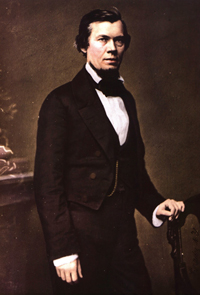 I
was one of eight children, all but one moved to Mississippi.
All of my siblings were successful people.
Two of brothers, William and George Nichols, became lawyers.
The eldest, Joseph Sidney, became a successful merchant but
remained in Leasburg, NC.
Two of my brothers, James Young, and Josh became prominent physicians.
My two sisters, Ann and Sarah both married well into wealthy and
prominent families. I
was one of eight children, all but one moved to Mississippi.
All of my siblings were successful people.
Two of brothers, William and George Nichols, became lawyers.
The eldest, Joseph Sidney, became a successful merchant but
remained in Leasburg, NC.
Two of my brothers, James Young, and Josh became prominent physicians.
My two sisters, Ann and Sarah both married well into wealthy and
prominent families.
As a child, I attended the Bingham Academy in Orange County, North
Carolina. My family was a
wealthy family, one of the wealthiest in the South.
I am proud to say that both of my parents were of Scottish
descent. Later I entered
the University of North Carolina when I was 17.
I went on to graduate from the University of North Carolina in
1831. I was first in my
class. While I was in
college, I thought about becoming a minister.
At UNC, I was a member of the Philanthropic Society.
There was always a severe rivalry with the Dialectic Society.
Being a Phi was one of the best experiences of my life.
I learned how to debate and orate and I made many lifelong
friends. My debating
experience served me well in my political career and in my legal career.
As I said, I graduated in 1831.
I was asked to be a member of the faculty, which was a great
honor. I served for 18
months. Then, I studied law
with the noted attorney James M. Dick in North Carolina.
I was admitted to the bar in 1834 and commenced practice in
Pontotoc, Mississippi. My
brother, James Young, who was a physician, suggested that I settle
there.
1835 was a very important year in my life.
I had moved to Mississippi.
I speculated, successfully, in land around Natchez, when the
Chickasaw Indians ceded lands to Mississippi.
I bought choice plots of land in the northern part of the State.
My friends would not let me keep out of politics.
Further, it was the custom, in my era, that wealthy men would
find a career in politics.
Our community was soon divided on the question as to whether the State
should endorse the Union Bank bonds for $5,000,000 or not.
The first political speech I ever made was at a meeting held at
Pontotoc for the purpose of favoring that policy and instructing the
representatives in the Legislature to vote for the endorsement.
I opposed the resolution in a strong and able speech, which
attracted attention throughout the State.
I denounced the banking mania which was running riot over
Mississippi, and predicted that the sequence would be overwhelming ruin
and universal bankruptcy.
The resolutions were adopted, however, but in a short time the whole
State had serious cause to regret that my warning had not been heeded.
I was then elected to my first of six terms in the US Congress.
I made my home in Oxford, Mississippi. In 1837, I was not
re-elected to Congress. But
I spent my time wisely, for I courted and married my “beautiful Kate”,
that is Miss Catherine Ann Jones, who was 17, in 1839.
My “beautiful Kate”, came from a wealthy planter family with
extensive land holdings.
She had attended finishing school in France for two years before we
married. She brought a
trunk of gold as her dowry.
Together we built
Home Place,
our plantation in Mississippi.
We owned three plantations in total.
We had one child, Caswell Nacon Thompson.
In addition, my law practice boomed. I also became the State Leader of
the Democratic Party. I
seemed to be destined for great things.
I was elected to Congress in 1839 and served five terms until
1847. These were tumultuous
times. During my time, I
tried to exert powerful influence in our Nation’s capital while Webster,
Clay, and Calhoun were crossing swords.
For example, I was in Congress when Texas was admitted as a slave state.
President Polk signed the resolution to accomplish this.
But issues with Texas, as to her claims to lands north and west
of her, were not resolved until the Compromise of 1850, which was after
I left Congress.
Back home, the Union Bank became utterly bankrupt.
The bonds of the Bank which the State had endorsed, and on which
the Bank had raised capital to run its career, had been dishonored and
the State was called upon to renew its endorsement.
The Governor had refused payment on the ground that the State was
not legally or morally bound, and an appeal was made to the people.
I was called upon for my views. I supported the Governor in his
refusal to honor the bonds.
My letter to the Governor setting forth this position was so clear that
my views were accepted by the people and were adopted by the Legislature
of the State.
In 1844, I did a great deal to secure the nomination of James K. Polk
over Henry Clay. As I said,
I had crossed swords with Mr. Clay over Texas and I was determined that
he would not be president.
Clay had opposed the annexation of Texas, which I supported.
I co-authored a letter with Robert J. Walker which made Texas the
issue of the election and which assisted Polk to be elected.
After Polk had been elected, Polk told Robert J. Walker that he could
only offer him the Cabinet position of Attorney General.
Walker felt that this position was not prestigious enough and
wanted a higher cabinet position. I exercised my powers of persuasion
and induced Polk to grant him the position of Secretary of the Treasury.
Walker proclaimed me as his best friend and said that he would
never forget what I had done for him.
Unfortunately, Walker later proved to be an unprincipled
office-seeker and was basely ungrateful to me. I never spoke to him
again. I viewed him as
being a vile varmint.
I was appointed as Senator in 1845, but to my bitter disappointment, I
never received my commission, so I was never seated.
In 1853, President Franklin Pierce offered me the Consular Office
in Havana, Cuba. This
position was considered to be the grandest political prize of all.
I thought that I would lose my law practice if I went and besides
my extensive land holdings and plantations would have suffered.
In addition, I wanted to stay with my wife at our home -
Home Place.
My disappointment over not being appointed to the Senate was later
compounded when I ran for Senator in 1855 and lost to Jefferson Davis.
In 1856, I supported James Buchanan for president.
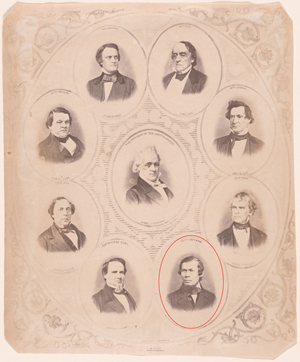 In
1857, I was appointed as the Secretary of the Interior by President
Buchanan. I was glad to
serve my country and my president.
I found the Department a mere aggregation of bureaus, working
entirely without concert, and the Secretary a mere figurehead.
I was quite an executive.
With my old-time energy, I went to work and infused new life into
every department and united all the business under one head, with me as
the director. The
department grew in favor and popularity with the whole country.
The business transacted by it was enormous.
The volumes of the decisions of Secretary Thompson in law cases
alone were larger than those of the Attorney General. In
1857, I was appointed as the Secretary of the Interior by President
Buchanan. I was glad to
serve my country and my president.
I found the Department a mere aggregation of bureaus, working
entirely without concert, and the Secretary a mere figurehead.
I was quite an executive.
With my old-time energy, I went to work and infused new life into
every department and united all the business under one head, with me as
the director. The
department grew in favor and popularity with the whole country.
The business transacted by it was enormous.
The volumes of the decisions of Secretary Thompson in law cases
alone were larger than those of the Attorney General.
But that was when my name was sullied with the taint of embezzlement.
The Appeal and Disbursing clerk in my bureau stole bearer-bonds
from our safe-almost $3,000,000.
The minute I found out about the empty safe, I went to the
Secretary of State and the Attorney General.
The clerk finally admitted to the theft after an investigation.
The report, issued in late January 1861, concluded that “no one
discovered anything to involve the late Secretary, Honorable Jacob
Thompson, in the slightest degree in the fraud…”
This was damning by faint praise.
Most people concluded that I was involved but they just had not
found the evidence! I
viewed this as being just the way we expressed ourselves at the time.
While still serving as Interior Secretary, I was appointed by the State
of Mississippi as a "secession commissioner" to North Carolina, with the
task of trying to convince that state to secede from the Union in the
wake of the 1860 presidential election.
On December 17, I passed through Baltimore on the way to North Carolina.
"Secretary Thompson has entered openly into the secession
service, while professing still to serve the Federal authority," the
New York Times
reported on December 20.
The next day, I met with Governor John W. Ellis in Raleigh.
He wrote an open letter to Ellis which was published in the
Raileigh State Journal
on December 20. Thompson
wrote that the South faced "common humiliation and ruin" if it remained
in the Union. I warned that
a Northern "majority is trained from infancy to hate our people and
their institutions" and would overthrow slavery.
The result would be "the subjugation of our people."
I resigned as Interior Secretary on January 9, 1861.
When I resigned, Horace Greeley's
New-York Daily Tribune
denounced me as "a traitor", remarking,
"Undertaking to overthrow the Government of which you are a sworn
minister may be in accordance with the ideas of cotton-growing chivalry,
but to common men cannot be made to appear creditable."
I categorically state I was not a traitor.
I was loyal to my state of Mississippi, and to the new nation of
which my state was a part, the Confederate States of America.
I have always been unwaveringly a states’ rights advocate. It is
my state over the central government every day and always!
Still, people claimed that I informed the State of South Carolina that
the
Star of the West
was bound for Charleston’s Fort Sumter, even though that decision was
made by President Buchanan days after I had resigned and weeks after I
had left Washington!
I became Inspector General of the Confederate States Army.
Though not a military man, I later joined the army as an officer
and I served as an aide to General P.G.T. Beauregard at the Battle of
Shiloh. I was wounded at
the Battle of Water Valley, Mississippi in 1862.
My horse was shot from under me and I was wounded.
I attained the rank of lieutenant colonel and was present at
several other battles in the Western Theater of the war, including
Corinth and Vicksburg. I
was on General Pemberton’s staff throughout Vicksburg. I managed to
avoid capture.
I ran for and won a seat in the Mississippi State legislature in the
fall of 1863. In March
1864, Jefferson Davis asked me to lead a secret delegation in Canada.
The President had heard that several thousands of people in Ohio,
Indiana, and Illinois, were weary of the war and were ready to take up
arms and demand of the United States Government a cessation of
hostilities. The
Confederate Congress had voted an appropriation of $1,000,000.00 toward
arming these people, and directed President Davis to send one of our
most discreet and reliable citizens to Canada, to confer with those who
sympathized with the Confederacy and were willing to aid in bringing the
war to a close. This was a
secret mission and one liable to subject the ambassador to slander and
misrepresentation by the unscrupulous. I hesitated before accepting it.
But I felt it to be my duty to serve my country in any honorable
way possible, and I finally accepted.
I was to be chief Commissioner of this operation and treasurer also.
The other members of my Commission were former US Senator Clement
Clay of Alabama and James P. Holcomb.
Davis’ oral instructions to me were to aid the large resistance
organizations operating in Ohio, Indiana, and Illinois to support the
Confederacy and do what damage I could to the war effort of the Union.
We were to go to Montreal.
I also received written orders from the president, which merely said I
was to go to Canada and carry out President Davis’ oral instructions “in
such manner as shall seem likely to conduce the furtherance of the
interests of the Confederate States…”
There have been allegations that I absconded with the money with which I
was entrusted by Davis, some $900,000.00. (This would be worth
$18,374,979.60 today!) (This would be a weight in gold of 3260.13
standard pounds!) These are
founded upon the fact that I never gave an accounting of the
distribution of these funds.
But I swear that every penny was spent doing the work for the
salvation of the Confederacy.
I will try as far as I can to list the distributions of the funds
as best I can.
I ran the blockade at Wilmington, N. C., and sailed on the
Alpha
to Halifax, Nova Scotia; from thence I went to Toronto, and then to a
point south-west of Montreal where I could confer with the people of the
States of Ohio, Indiana, and Illinois.
At Toronto, Clay, claiming being ill, refused to go further to
Montreal and demanded that $95,000.00 be put in a personal bank account
in a Toronto Bank. Toronto
was a dangerous place to be: it was filled with Yankee spies!
After much hesitation, I did so.
Clay never gave an accounting of this $95,000.00.
I arrived in Montreal in May of
that year. There I was met
by James Holcomb, a member of the Judiciary Committee who was already
present in Canada. He had
been trying to arrange the escape of 400 Confederate soldiers, to no
avail. I also met Captain
Thomas Henry Hines who was military mission authority.
Hines had been with General John Hunt Morgan’s raid and had
escaped capture.
I deposited the remaining $805,000 in a Montreal Bank, which, for some
reason, seems to have lost all its records about my account. So, I do
not have an account for every transaction.
In early June, 1864, I got in contact with Copperheads, Peace Democrats,
Knights of the Golden Circle, Order of the American Knights, the Sons of
Liberty, and others, all of whom were groups that wanted peace, were
sympathetic to the Confederacy, and for various reasons, were opposed to
Abraham Lincoln. Hines was
critical of my liberal distributions of funds.
I thought that I should spread the money around, so whenever a
Confederate came to me with a plot or a plan to disrupt the Union or
otherwise harass Yankees, I bankrolled it.
I freely distributed large amounts such as $10,000 or $50,000 to
such persons.
I met with and gave funds to Clement Vallandigham, the Peace Candidate.
He told the Sons of Liberty, had 40,000 members in Ohio, 50,000 in
Indiana, and 80,000! In Illinois.
There tens of thousands of Confederate prisoners in camps in the
Midwest. I gave in total
$500,000 to the Copperheads in various plots to free Confederate
prisoners, none of which came to fruition.
On June 13, 1864, I met with former New York Governor Washington Hunt at
Niagara Falls. According to
the testimony of the Peace Democrat Clement Vallandigham, Hunt met me,
and talked to me about creating a Northwestern Confederacy, and Hunt
obtained money for arms for insurrection.
I also gave Benjamin Wood, the owner of the
New York Daily News,
money to purchase arms.
I also wanted to buy all the newspapers on sale to prevent
Lincoln’s re-election.
Thereafter, Holcomb and Hine, to whom I gave $25,000, hatched the plan,
which failed, to free Confederate prisoners of war on Johnson's Island,
off Sandusky, Ohio, in September 1864.
I gave funds to John Yates Beall, a Confederate naval hero, to
capture the U.S. Cutter
Michigan,
the only armed ship on the Great Lakes to harass the Yankee ports there
and disturb trade. This
plot, like all the others, failed.
I also arranged the purchase of a steamer, with the intention of
arming it to harass shipping in the Great Lakes.
As usual, this plan failed.
It was at this time, I sent Holcomb and Hines home.
I gave them extensive funds to make the arduous journey running
the blockade. I had been
outfitting, equipping, and otherwise acting as a quartermaster to a
small group of soldiers. It
became too expensive to continue this operation so I disbanded it. It
was led by a Lieutenant Bennet Young.
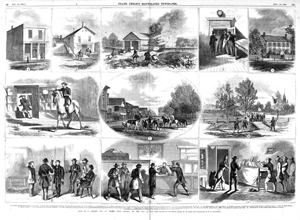 In
October of 1864 a most unfortunate event occurred, which was not only
without my prior knowledge, but also wholly without my express approval.
On October 19, 1864, Lieutenant Bennet Young and 20 other
Confederates, disguised as hunters, vacationers, and fisherman slipped
across the Canadian border and entered the town of St. Albans in
Vermont. They robbed three
banks, of $200,000, burned homes and other buildings, killed one
resident and wounded others.
They fled the town followed by a posse which captured some, but
across the border, the raiders were forced to be released by the
Canadian Mounties into their custody. In
October of 1864 a most unfortunate event occurred, which was not only
without my prior knowledge, but also wholly without my express approval.
On October 19, 1864, Lieutenant Bennet Young and 20 other
Confederates, disguised as hunters, vacationers, and fisherman slipped
across the Canadian border and entered the town of St. Albans in
Vermont. They robbed three
banks, of $200,000, burned homes and other buildings, killed one
resident and wounded others.
They fled the town followed by a posse which captured some, but
across the border, the raiders were forced to be released by the
Canadian Mounties into their custody.
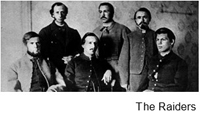 The
Union wanted those captured extradited, but Canada refused.
In fact, Canadian authorities contacted me and asked me to supply
funds for the proper defense of these men.
I personally intervened. I gave a speech, behind closed doors, to
the Cabinet. The Cabinet
then issued a decree that the raid was a “hostile expedition by the
Confederate States” and determined that the raiders were acting under
orders. They were soon
released. Canada returned some $88,000 in funds which had been taken
from the raiders. The
remaining $112,000 was never recovered.
I think the townspeople of St. Albans exaggerated the amount
stolen. It has been alleged
that I got the remaining $112,000.00, but this is untrue.
I never had anything to do with this operation. It was done
without my knowledge and permission. The
Union wanted those captured extradited, but Canada refused.
In fact, Canadian authorities contacted me and asked me to supply
funds for the proper defense of these men.
I personally intervened. I gave a speech, behind closed doors, to
the Cabinet. The Cabinet
then issued a decree that the raid was a “hostile expedition by the
Confederate States” and determined that the raiders were acting under
orders. They were soon
released. Canada returned some $88,000 in funds which had been taken
from the raiders. The
remaining $112,000 was never recovered.
I think the townspeople of St. Albans exaggerated the amount
stolen. It has been alleged
that I got the remaining $112,000.00, but this is untrue.
I never had anything to do with this operation. It was done
without my knowledge and permission.
On October 24, 1864, I met with the Peace Candidate for Illinois
Governor, James C. Robinson.
After our talk, I recorded in my journal that I gave him $40,000
for his campaign.
Unfortunately, he got drubbed at the polls.
One plot was a planned burning of New York City on November 25, 1864.
I planned this as just retaliation and retribution for Union
Generals Philip Sheridan and William Tecumseh Sherman's scorched-earth
tactics in the South. I
would note that my home, my favorite plantation, called
Home Place,
in Oxford, Mississippi was burned down by Union troops in 1864.
One Confederate, Robert Kennedy, was captured, tried, and hung
for his activities in the arson.
I was ordered by this time to hatch plots to burn Buffalo, Detroit, and
other cities along the Canadian border.
There have been allegations that I was the leader of Confederate
Secret Service operations in Canada.
That is simply not true.
I was regarded in the North as a schemer and conspirator, many devious
plots were associated with my name, though I am sure that much of this
was public hysteria in the North.
I was simply a soldier doing my duty for his country.
In March of 1865, arrest warrants were issued for me by the Federal
Government. Some have
speculated I met John Wilkes Booth, who assassinated Abraham Lincoln,
but not only has that has not been proved, but also it never happened.
I have spent years after the war working hard to clear my name of
involvement in the assassination.
In actuality, I had been a friend of Abraham Lincoln in Congress.
Just hours before his assassination, he prevented Federal agents
from pursuing me to Europe and arresting me.
After the Civil War, I fled to England for two years and then lived in
France in a sumptuous hotel for three years.
Later I returned to Canada as I waited for passions to cool in
the United States. I
eventually came home and settled in Memphis, Tennessee, where I could
manage my extensive holdings.
I was later appointed to the board of the University of the South
at Sewanee and I was a great benefactor of it.
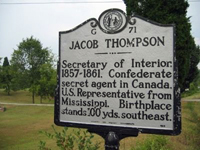 I
died in Memphis in 1885 and I was interred in Elmwood Cemetery.
Republicans and Union veterans condemned President Grover
Cleveland administration's lowering of flags to half-mast in Washington
and Secretary of Interior Lucius Quintus Cincinnatus Lamar II's closure
of the Department of Interior to honor me after my death. I
died in Memphis in 1885 and I was interred in Elmwood Cemetery.
Republicans and Union veterans condemned President Grover
Cleveland administration's lowering of flags to half-mast in Washington
and Secretary of Interior Lucius Quintus Cincinnatus Lamar II's closure
of the Department of Interior to honor me after my death.
Last changed: 02/28/23 |

